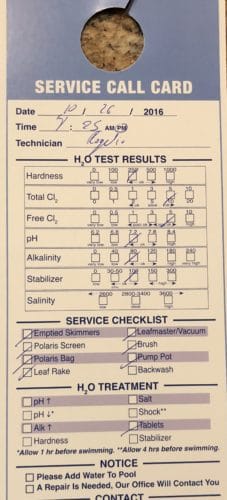For the first time, my wife and I have a home with a swimming pool in the backyard. When we bought the house, this created a new item for my standardized work: cleaning and maintaining the pool.
Not knowing the first thing about the complexities of a pool, with its chemicals and equipment, it was an easy decision to outsource this cleaning and maintenance, continuing to use the company that the previous homeowner used.
I don't know what I'm doing with the pool and I'm gone too often. Even with the pool maintenance company giving me an “orientation” class about the pool, about the only thing I understand is how to add more water to the pool.
Recently, I came back from a trip and noticed that the pool filter and cleaner wasn't running as it's programmed to do during the day. First-world problems, I know.
The first time this happened, last year, I had to call the company to ask them what was wrong. It turned out that the service technician, in his weekly visit, had failed to take the pool out of “service mode.”
I learned to see the blinking red light on the controller box that indicated it was still in service mode. And, I learned how to go outside to push a simple button that takes the pool back out of service mode. Easy.
I think the “defect rate” for the service – forgetting to take the pool out of service mode – is about three occurrences out of about 100 weekly service visits.
The second time it occurred, I called the company to inform them that the pool had been left in service mode. They said they'd talk to the technician. Maybe they'd remind him. I hope they didn't yell at him.
Reminding somebody to not forget something isn't the best strategy, when it comes to pool maintenance or any workplace.
The third and most recent time this occurred, I called the company. They first said, “We'll send somebody out immediately.” I said, “No, I remember how to press that button…”
The company rep I was talking to said, “We'll talk to the technician about this.”
I said, “Even better… I have a suggestion for you if you have a minute.”
They did.
I reminded them that they use a checklist each week and they hang it on my door. The checklist (pictured at left, click for a larger view) shows me what work was done, any actions I need to take, and it probably serves as a prompt to the technician to do certain things.
It also shows who the technician was, but as I told the company, I wasn't looking to blame or punish anybody. It's possible that three different technicians forgot to take the pool out of service mode, which seems to make it a systemic problem.
My suggestion to the company was to ADD an item to the checklist with a box that says:
“Pool taken out of service mode” or something like that.
It could be at the bottom of the checklist to, for one, serve as a prompt to the technician and, secondly, to communicate to the homeowner that this occurred.
Now, I've seen in many workplace settings, including hospitals, that having a checklist doesn't mean that the work was done with 100% certainty. I've seen medical supply restocking checklists that were “pencil whipped” – meaning somebody just checked the boxes without doing the work. People might do that when under time pressure – that's a system problem (it could be a training or communication issue in that hospital).
Either way, I'm curious to see if the pool company modifies their checklist. They would have some cost and effort involved in doing this. Who knows how large of a batch of door hanger checklists get printed at a time. But, a little bit of cost and effort would pay off in terms of fewer customer complaints and less time spent addressing these calls that come in. Plus, the customers' pools would stay cleaner if the pool isn't left in service mode for days (or longer) when the homeowner is out of town.
I think a checklist would be far more effective than cycles of mistakes, reminders… and then more mistakes. The solution isn't hiring “less forgetful” people. I don't think me hanging a warning sign (“Don't forget to take the pool out of service mode!”) is the right solution either (signs can get ignored and tuned out). See my website about warning signs and posters…
Have you used checklists in your workplace? See my previous posts on this subject and be sure to get Dr. Atul Gawande's book on the subject if you haven't already read it.
A few favorite checklist posts:
What do you think? Please scroll down (or click) to post a comment. Or please share the post with your thoughts on LinkedIn – and follow me or connect with me there.
Did you like this post? Make sure you don't miss a post or podcast — Subscribe to get notified about posts via email daily or weekly.
Check out my latest book, The Mistakes That Make Us: Cultivating a Culture of Learning and Innovation:










LinkedIn comments:
Gretchen Reabe-Budde
I’ve had the opportunity to fly and learn from some amazing pilots, pilots with over 50 years experience in the cockpit. The piece that always stuck with me was before every take off and before every landing there is a check list that is pulled out and gone through.
Even the most decorated of pilots completed this step. To me it was always humbling and reassuring to see the checklist come out, but also just makes sense.
Bruce Andersen:
A strong 5S implementation also is a good poke yoke. Keep It Super Simple (KISS) and people make fewer mistakes. Sustaining is always the long term issue. I wonder how pilots have been able to sustain the checklist procedure for all these years.
My reply to Bruce:
How are they able to sustain it? From pilots I know: 1) They believe that checklists are helpful and 2) Checklists can save their own lives. That’s the difference between a surgeon and a pilot… a surgeon isn’t going to be killed a system problem or their mistake that wasn’t mistake proofed.
A great piece of advice. As Mark Graban mentions, it is applicable to more than just the medical field.
Within the medical field, though, it is especially applicable to automation. I have seen many a healthcare automation suite offer checklists as a method for improving efficiency and reducing errors.